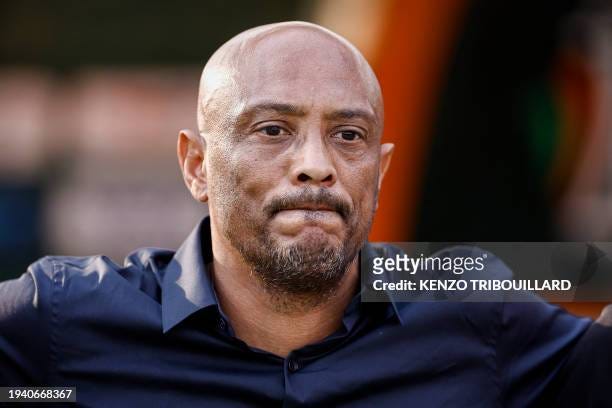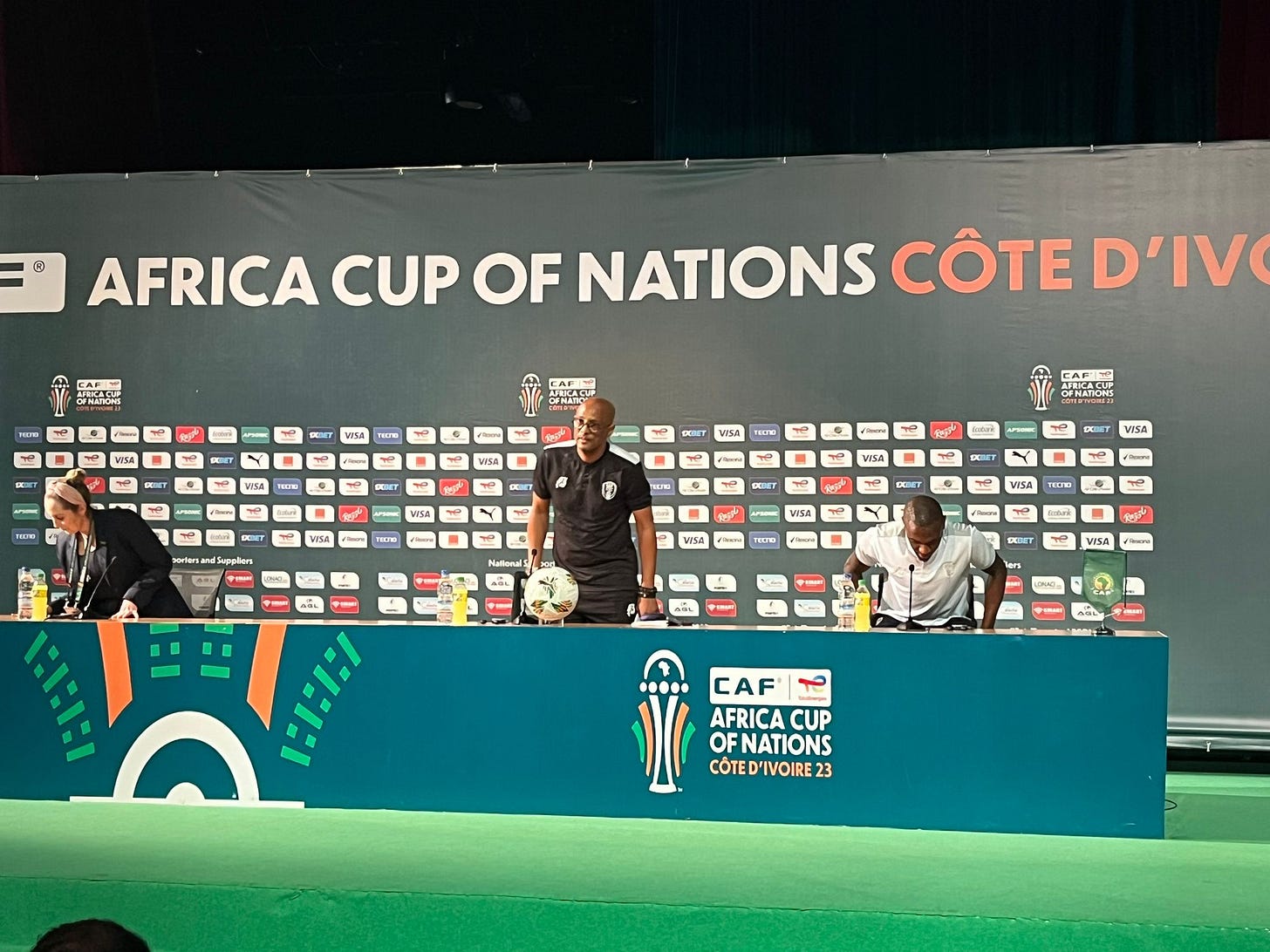Amir Abdou: the Comorian youth worker who became the "Mauritanian Guardiola"
How a civil servant from south west France became a national hero in two African countries
Ten years ago, Amir Abdou was an amateur football coach in western France. This evening he will lead out Mauritania in their first ever Africa Cup of Nations knockout match against Cape Verde.
It has been quite a journey for a man who in Mauritania is now referred to as the “Guardiola”.
Humble beginnings
Abdou’s is not what you would call a conventional story but one tied inextricably with the Comoros, the tiny archipelagic nation off the east coast of Africa.
Abdou wasn’t born or raised on the islands but rather in the large diasporic community in Marseille. But such is the size of the Comorian community in the city and it’s ties with the country that it is affectionally known as the fifth island of the Comoros.
In early 2014, while Abdou was coach of sixth division side FC Golfech he got a call that changed his life. Abdou was offered the chance to coach the country of his parents.
It was a tall order to say the least. The Comoros had not played any match of any kind in over a year and had not won a match since a 2-1 win against the Seychelles in 2009. But Abdou was not daunted.
“He brought medical staff, he brought a keeper coach, assistant coach, physiotherapist and, team manager. Things like this. We never had that before,” current captain of the Coelecanths Youssouf M'Changama told On The Whistle. “He said, ‘I want this national team to be professional.’”
Abdou made an immediate impact. His first game was a friendly against Burkina Faso, who had a year previously made it to the final of the Africa Cup of Nations. In front of a buoyant “home” crowd in Marseille, the islanders drew 1-1.
It wasn’t easy. Abdou wasn’t paid a full salary until 2017 and was forced to continue his job as a civil servant. His backroom staff were constantly being turned over because they were all working as volunteers.
“Lots of times he lost an assistant coach because the assistant coach has a new job,” said M’Changama who had lost count of the number of assistants Abdou had during his time with the Comoros. “And he'd find a new one, a good one. Always.”
Unlike most national team managers, this was Abdou’s first taste of professional coaching and he was often learning from his players.
“He improved and became professional a lot through us,” say former captain Fouad Bachirou, who played for the Comoros throughout Abdou’s entire tenure. “And of course through his quality of like willing to learn and like, want to study the game”
History maker
It was slow work but over the next eight years Abdou would put together a team of predominantly French-born Comorians like himself that could compete with the very best on the African continent.
It took him two years to win his first game with the Coelecanths but eventually he turned the team into a stubborn defensive side that would make life difficult for any team particularly when playing at home on the islands.
Thanks to that home form the Comoros did the unthinkable when they qualified for their first ever AFCON in 2020 which included a historic 0-0 draw with seven times African champions Egypt in Moroni.
It was at that Cup of Nations where Abdou announced himself on the world stage. Having competed but ultimately lost to Gabon and Morocco the Comoros had a slim chance of qualifying to the next round. But they would have to beat four-time AFCON champions Ghana.
The Islanders took a 2-0 lead before the Black Stars fought back to equalize. But an 85th minute winner from Ahmed Mogni who plays in Luxembourg sent Ghana out and the Comoros through to the next round.
From Moroni to Marseille, hundreds of thousands of Comorians took to the streets to celebrate one of the greatest moments in the country’s entire history.
In the next round the team faced champions Cameroon and despite playing without a recognized goal keeper and only ten players for 80 minutes they narrowly lost 2-1, ending the fairytale.
That win against Ghana and the performance against Cameroon were not luck or born out of some heroic effort, but rather the planning and preparation of an obsessed coach.
“This guy doesn’t sleep I think sometimes because he looks tired. He looks sick sometimes,” laughs M’Changama. “In his office, you see the all the wall some papers with the name of the team, the opponent and things like this. All the wall around the room.”
A new challenge
After eight years in charge of his home country Abdou decided to call it quits and left the national team. But within a month he was snapped up by Mauritania, initially taking over the most decorated club in Mauritanian football FC Nouadhibou before being asked by the Mauritanian Football Federation to take over the national team.
Within two years Abdou had taken the team to a first ever quarter final finish at the African Nations Championship -the AFCON in which only locally based players can compete- and had qualified the team for its third AFCON.
In qualifying for the tournament in Côte d'Ivoire, Abdou became the first African manager to take charge of a nation more successful than his own and take them to the continent’s premiere tournament.
In a déjà vu, Abdou has taken unfancied side that had never before won a match at the Cup of Nations and not only won their first ever game but also dumped out a giant of African football in Algeria, on their way to a first ever knockout appearance.
Just like Comoros, videos of thousands of Mauritanians flooding the streets of Nouakchott to celebrate an unthinkable win went viral. 12 years ago only Timor-Leste, Andorra, Montserrat and San Marino were ranked lower than Mauritania. On Tuesday, while Ghana, Tunisia and Algeria were dumped out of the competition, Mauritania marched on, and they have one man to thank for that.
“I’m totally trusting in him. Every single Mauritanian is trusting in him right now and even some are calling him Mauritania’s Guardiola,” Mauritanian journalists Saddam Dada tells On The Whistle.
Hassen Ndiaye, a Mauritanian journalist based in Nouadhibou agrees.
“He’s a hero in Mauritania,” he says. “Many people, among them senators, have even called on the government to even give him Mauritanian citizenship.”
Whether or not he is made a Mauritanian citizen, Amir Abdou has completely transformed the nations fortunes, as he did for the Comoros.
Mauritania now faces fellow overachievers Cape Verde in the next round and you wouldn’t put it past the civil servant from rural France making history once again in African football.





